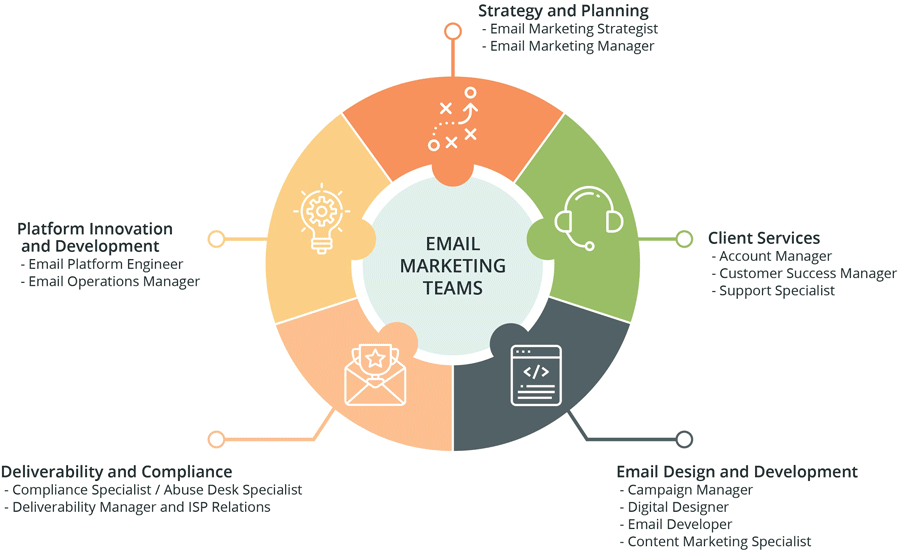Email Marketing
Email marketing is one of the most effective and cost-efficient digital marketing strategies available to businesses today. It involves sending targeted emails to a group of people to promote products, share updates, build relationships, and drive engagement. Despite the rise of social media and messaging apps, email marketing remains highly valuable due to its direct, personal, and measurable nature. It allows businesses to communicate with their audience in a more focused and personalized way, offering content that is relevant to their needs and interests.
One of the main strengths of email marketing lies in its ability to nurture leads and build long-term customer relationships. Through welcome emails, newsletters, product updates, and exclusive offers, businesses can stay top-of-mind with their audience and guide them through the customer journey. For example, a new subscriber may first receive a welcome email, then gradually receive more information about the company’s offerings, and finally be encouraged to make a purchase or sign up for a service. This structured flow is often referred to as a sales funnel, and email is a powerful tool to guide users through it.
Another significant advantage of email marketing is personalization. Modern email marketing platforms allow businesses to segment their email lists based on factors like demographics, user behavior, purchase history, and engagement level. This means that instead of sending the same message to everyone, marketers can tailor content to specific groups, increasing the chances of engagement and conversion. Personalized subject lines, product recommendations, and dynamic content create a more meaningful experience for the recipient and build a stronger connection between the brand and its audience.
Automation is another key benefit. Email marketing automation allows businesses to send emails based on triggers or actions taken by users. For instance, if a user abandons a shopping cart on an e-commerce site, an automated reminder email can be sent within hours to encourage them to complete the purchase. Other examples include birthday emails, re-engagement campaigns for inactive users, and post-purchase follow-ups. Automation saves time, increases efficiency, and ensures that the right message reaches the right person at the right time.
In terms of return on investment (ROI), email marketing consistently ranks among the highest-performing channels. According to industry reports, for every $1 spent on email marketing, businesses can expect an average return of $40. This impressive ROI is due to the low cost of sending emails compared to traditional advertising methods, combined with the high conversion rates achieved through personalized and targeted campaigns. Additionally, email marketing provides measurable results through metrics such as open rates, click-through rates, bounce rates, and conversion tracking, enabling marketers to evaluate and optimize their strategies continuously.
Content is the heart of any successful email marketing campaign. Well-crafted emails include compelling subject lines, clear and concise messages, strong calls-to-action (CTAs), and visually appealing design. The content must provide value—whether it’s offering a discount, sharing a helpful blog post, announcing a product launch, or simply keeping the audience informed. A/B testing can help determine which content formats or subject lines perform best, allowing for continuous improvement over time.
Mobile optimization is also critical. With a large percentage of emails now being opened on mobile devices, it’s essential that email designs are responsive and easy to navigate on smaller screens. Poorly formatted emails can lead to high unsubscribe rates and lost engagement opportunities. Therefore, ensuring a smooth user experience across devices is a priority in modern email campaigns.
In conclusion, email marketing remains a vital component of a successful digital marketing strategy. It enables direct, personalized communication with prospects and customers, supports lead nurturing, drives conversions, and builds brand loyalty. With its high ROI, automation capabilities, and measurable performance, email marketing continues to be a powerful tool for businesses of all sizes. By creating targeted, valuable, and engaging content, brands can turn subscribers into loyal customers and long-term advocates.

Here are the main 2 focus points for effective Email Marketing:
Personalization & Segmentation:
Tailor your emails based on user behavior, preferences, and demographics to deliver relevant content. Personalized emails increase engagement, click-through rates, and conversions.Valuable Content & Clear CTA:
Provide useful, engaging content that meets the recipient’s needs and always include a clear, compelling call-to-action (CTA) that guides the reader toward a desired action.
